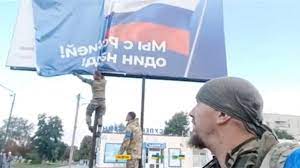
Wednesday
Here’s an instance of poetry stepping out of the pages of a book and onto the battlefield. As Ukrainian troops were tearing down Russian propaganda signs in liberated Balakliya, which had been occupied since March, they discovered that the invaders had papered over a passage by Ukraine’s national poet, Taras Shevchenko. Ukrainian tweeter “Ipa” alerted me to the incident—you can view it here—along with a translation of the passage and its history.
Imagine that you have just liberated an area and suddenly the following lines blaze forth to greet you:
And glory, mountains blue, to you,
In ageless ice encased!
And glory, freedom’s knights, to you,
Whom God will not forsake.
Keep fighting — you are sure to win!
God helps you in your fight!
For fame and freedom march with you,
And right is on your side!
(Trans. John Weir)
The poem can be read in its entirety here. “Ipa” glosses it as follows:
This poem dates back to 1845. The leading theme of it is the passionate denial of the tsarist war in the Caucasus. Shevchenko created a sharp satire on the political, social, and ideological foundations of tsarist Russia: autocracy, serfdom, and Orthodoxy.
The poet eloquently debunks the colonialist essence of Russian imperialism with its hypocritical official demagoguery, soullessly cruel army, and docile bureaucratized church.
The poem is too long for me to discuss it in detail but here are a few thoughts. “The Caucasus” begins with an allusion to Prometheus, who stole divine fire for humanity and was chained for eternity to a rock, with an eagle daily eating his liver. In linking Ukraine with the Greek figure, Shevchenko reverses the story’s emphasis by noting that Prometheus never succumbs, despite the constant torture. Rather, he bounces back every day. The “sateless one” in the poem is never-satisfied tsarist Russia:
Mighty mountains, row on row, blanketed with cloud,
Planted thick with human woe, laved with human blood.
Chained to a rock, age after age
Prometheus there bears
Eternal punishment — each day
His breast the eagle tears.
It rends the heart but cannot drain
The life-blood from his veins —
Each day the heart revives again
And once again is gay.
Our spirit never can be downed,
Our striving to be free.
The sateless one will never plow
The bottom of the sea.
The vital spirit he can’t chain,
Or jail the living truth.
He cannot dim the sacred flame,
The great god’s fame on earth.
Invoking both the Babylonian captivity (in the Book of Jeremiah) and St. Paul’s prediction in his letter to the Romans (“every knee will bow before me; every tongue will acknowledge God”), Shevchenko foresees a time when “liberty and right” will prevail. He then adds, however,
But in the meantime, rivers flow,
The blood of men in rivers!
Mighty mountains, row on row, blanketed with cloud,
Planted thick with human woe, laved with human blood.
This dark picture recalls the civilian massacres and prisoner torture we have been witnessing for the past six months. With scathing sarcasm, Shevchenko talks how the tsarist forces have found
Poor freedom hiding ’mid the crags
(A hungry thing, and all in rags),
And sick’d our dogs to drag her down.
The tsar then thanks God for his victory, and in those lines one can’t help thinking about how the head of the Russian Orthodox Church has endorsed Putin’s invasion:
Temples and chapels, icons and shrines,
And candlesticks, and myrrh incense.
And genuflexion, countless times
Before Thy image, giving thanks
For war and loot and rape and blood,–
To bless the fratricide they beg Thee,
Then gifts of stolen goods they bring Thee,
From gutted homes part of the loot!
Counter to this, however, is the passage appearing on the sign—“Keep fighting—you are sure to win!”—which in the full poem is followed by a passage that reminds me of a speech President Zelensky gave two days ago. I find myself wondering whether Zelensky was channeling Shevchenko when he delivered the lines since they echo both the poet’s defiance and his characteristic sarcasm. In the poem, Shevchenko says that Ukrainians don’t need much so long as they are free to make their own decisions:
A hut, a crust — but all your own,
Not granted by a master’s grace,
No lord to claim them for his own,
No lord to drive you off in chains.
Zelensky’s speech came after Russia had bombarded several power stations, a war crime that left parts of the country in the dark. I frame Zelensky’s speech as a poem to reinforce the parallels:
Read my lips:
Without gas or without you?
Without you.
Without light or without you?
Without you.
Without water or without you?
Without you.
Without food or without you?
Without you.
Cold, hunger, darkness and thirst aren’t as scary and deadly for us
as your “friendship and brotherhood.”
But history will put everything in its place.
And we will be with gas, light, water and food
And WITHOUT you!
Russians may claim Ukrainians as friends and brothers—in fact, their extreme cruelty against Russian-speaking Ukrainians may be spurred by their disappointment at not being greeted as liberators—but Ukrainians have no such illusions. They have experienced the Russian yolk for centuries.